
20 Jun 2024
No regrets: Rachel tells her mum Janet’s AML story
Janet Mellor had contracted polio as a child and her family had been told that she would never be able to walk. But the 65-year-old from Worksop in Nottinghamshire defied all the odds and, despite having a deformity in her foot, lived an active life by working in retail, running her own baking business, and raising her two children, Rachel and David, alongside husband, John.
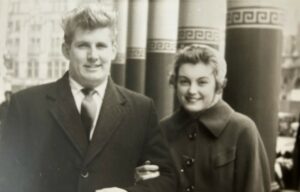
Janet and John when they were younger
But in July 2004 she started to feel increasingly tired.
Daughter Rachel Smith, 56, who also lives near Worksop said: “Mum was becoming increasingly exhausted, which was the opposite of her usual self. Her parents were told when she was 18 months old that she’d never recover from Polio – but she did. She walked all her life and was always on the go. But now she had no energy, she had bruises on her body and several mouth ulcers. After three days of really bad symptoms, I said she needed to go to the doctor. Mum’s GP knew her well and, when she walked into the surgery he said, ‘Janet you look absolutely dreadful’.”
Janet was sent to Bassetlaw District Hospital in Worksop for a blood tests and chest x-ray, as she had also become increasingly breathless.
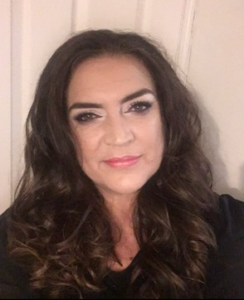
Janet’s daughter Rachel
Rachel said: “We left the hospital, and I settled Mum at my house before going to her house to get her post and some clothes. I said to her that she must stay with me so that I could look after her 24/7, to which she agreed. When I got to her house I noticed a brown handwritten envelope on the door mat. It was from the doctors saying ‘Janet please ring me as soon as you get this’. I rang the doctor and asked what was wrong, and of course the doctor couldn’t tell me. I said I would go straight back to my house and get Mum to ring. The phone call seemed to take forever and was dreadful hearing the one-sided conversation. She put the phone down and said I’ve got leukaemia. My mum was calm after she’d taken the phone call, but I was distraught.”
Janet was diagnosed with acute myeloid leukaemia (AML) on 9th July 2004 – her 65th birthday. Rachel took her straight back to the hospital, where Janet was immediately given two units of blood. Janet felt immediately revived and hopeful.
Rachel continued;
“But later that day, two consultants came to see Mum and said she had a two in 10 chance of survival. She was being blue lighted to the haematology unit at the Royal Hallamshire Hospital in Sheffield. When they told her what treatment she would need and how gruelling it would be I said to her you don’t have to do it Mum if you don’t want to. Of course I wanted her to, but I also felt she needed to be able to say no. But she wanted to try. The consultants also said if I hadn’t got her to the doctor she would have died in her sleep as her haemoglobin levels were low at only 6.3.”
The next day, Janet started ten days of chemotherapy.
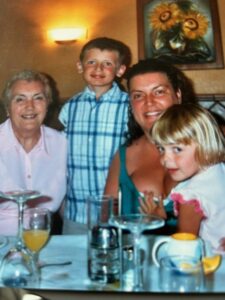
Janet with daughter Rachel and grandchildren
Rachel said: “Each cycle was the same amount but condensed into shorter and shorter periods of time. She lost all her hair, and she lost her appetite. She had a bleed from her gums which was horrendous due to her blood not clotting properly and she was given extra platelets. I asked if it was for financial reasons that my mum couldn’t have a bone marrow transplant and that I would remortgage my house to pay for the treatment. But they informed me that, due to my mum’s age, the treatment would kill her before the leukaemia would.”
Rachel travelled every day to the hospital sometimes three times per day for six months after taking a sabbatical from her job at the time in the prison service. Janet was allowed home for an occasional day if her blood levels were good. “My dad had passed away seven years before and I wanted to be there for Mum. I witnessed so many people on the ward lose their life, they become like a little family. I would help them when I visited Mum, I explained their little slip of paper with their most recent blood results as I had got so used to the terminology. I helped to feed some of the older patients and I consoled the younger ones who were in their late teens and early 20s. One girl was only 18 and it was her third bout of leukaemia, having first being diagnosed at the age of 11. She was an only child and lost her fight on Christmas Eve 2004. It was so harrowing watching them go through it.”
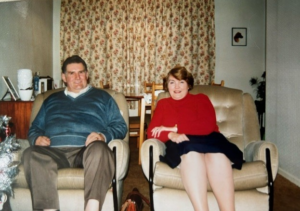
Janet with her husband John
On 8th October Professor Winfield came to see Rachel and Janet at her hospital bed.
“He drew the curtains and said, ‘I’m really sorry there is no more treatment available’. Mum asked how long she had left and he replied, ‘two weeks, but probably not that’. In my confused state I asked Professor Winfield ‘what about Mum’s blood and platelets’, and he replied ‘I’m sorry Rachel there are no more blood or platelets’. When I look back it was a silly question, but at the time I wasn’t thinking straight. I will always remember Professor Winfield – he was the senior consultant, always in his white coat, and very old school, but he sat and held my mum’s hand whilst he delivered the dreadful news. It’s something that I will never forget and it touched me greatly.”
Janet died after three rounds plus a trial fourth round of chemotherapy on the 12 October 2005 at 66 years old. Rachel carried out her last wish and got her back to her house, so that she didn’t pass away in hospital, a traumatic 18-mile journey by a transport ambulance.
Rachel, who now runs a successful dog grooming business, had to break the news to her children Alex and Georgia, who were only five and two years old at the time.
“I told them Grandad came to fetch Grandma. My mum absolutely adored those kids, and she’d met my dad when she was 15.
“If you get other types of cancer they can go in, cut it out and then do chemo, but your blood is circulating all the time. She was denied a bone marrow transplant because it was too risky – we need to find more treatments and save more people like my mum.
“I cope with the loss of my mum as I have no regrets. If I had my time again there is nothing that I could have done more to help her through this, not through duty, but through love.”
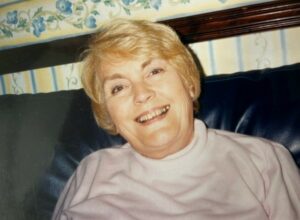
Discover more stories from our community.
Related posts
25 June 2019
Championing groundbreaking therapies and emotional support
We are proud to be at the forefront of funding innovative research into gene therapy treatments
12 December 2022
Widespread coverage of new leukaemia therapy shows promise in first trial patient
As you may have seen in the news over the weekend, a clinical trial investigating a new leukaemia treatment has shown promising results. As part of the trial, funded by…
4 April 2022
Leukaemia UK launches search for five new talented Trustees
We are looking for a talented and diverse set of Trustees to join our Board, and help guide the charity as we embark on an ambitious new strategy to accelerate progress in leukaemia research to stop leukaemia devastating lives.
29 February 2024
Nurse who made throwaway comment before blood cancer diagnosis welcomes new research boost into ‘Natural Killer’ cells
A former nurse, midwife, health visitor and NHS manager is welcoming new research into her particular blood cancer, after not recognising her mystery symptoms were leukaemia. Kay Cutting, from Seaham…